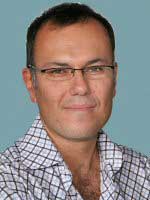
13th International Forum on Embedded MPSoC and Multicore
July 15-19, 2013, Otsu, Japan

Speaker:
Babak Falsafi, EPFL, Switzerland
Title:
Big Data and Dark Silicon: Taming Two IT Inflection Points on a Collision Course
Abstract:
Information technology is now an indispensable pillar of a modern day society, thanks to the proliferation of digital platforms in the past several decades. We are now witnessing two inflection points, however, that are about to change IT as we know it. First, we are entering the “Big Data” or the Data Deluge era where demand on robust and economical data processing, communication and storage is growing faster than technology can sustain. Second, while forecasts indicate that chip density scaling will continue for another decade, the diminishing returns in supply voltage scaling and the impending “energy wall” is leading server designers towards energy-centric solutions and eventually Dark Silicon. In this talk, I will motivate these two IT trends and present promising research avenues to bridge the gap between Big Data IT resource demands and energy efficiency of server platforms.
Bio:
Babak joined the School of Computer and Communication Sciences at EPFL in 2008. Prior to that, he was a full Professor of Electrical & Computer Engineering and Computer Science at Carnegie Mellon. He is the founding director of the EcoCloud research center pioneering future energy-efficient and environmentally-friendly cloud technologies at EPFL. He has made numerous contributions to computer system design and evaluation including a scalable multiprocessor architecture which was prototyped by Sun Microsystems in 1997, energy-efficient memory technologies that are cited by an Intel patent and incorporated into IBM BlueGene/P in 2008, and computer system simulation sampling methodologies that are in use by AMD and HP for research and product development. His most notable contribution has been to be first to show that contrary to conventional wisdom, multiprocessor memory programming models -- known as memory consistency models -- prevalent in all modern systems since the inception of microprocessors are neither necessary (shown in ISCA'99) nor sufficient (shown in ISCA'07) to achieve high performance. He is a recipient of an NSF CAREER award in 2000, IBM Faculty Partnership Awards in 2001, 2003 and 2004, and an Alfred P. Sloan Research Fellowship in 2004. He is a fellow of IEEE.